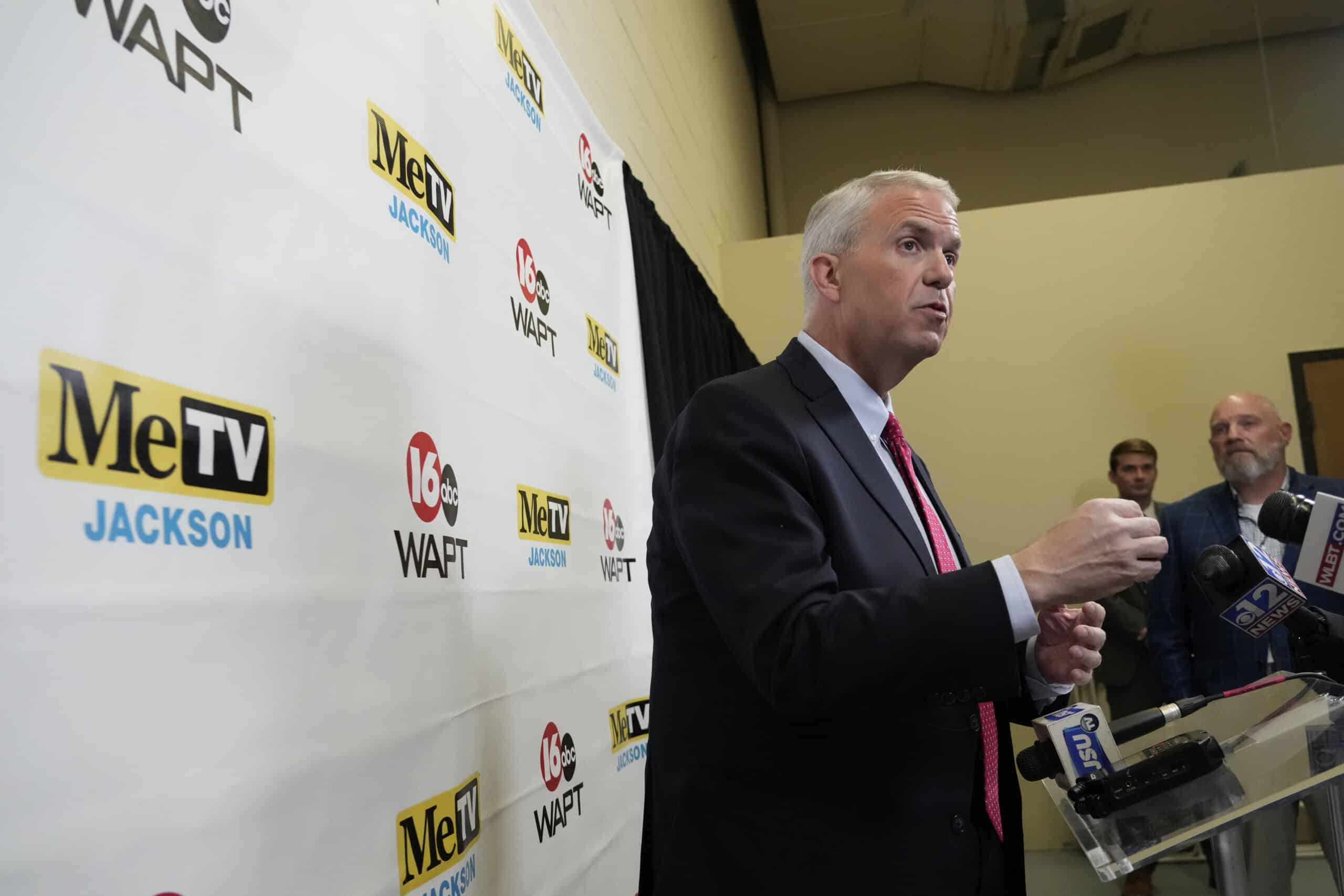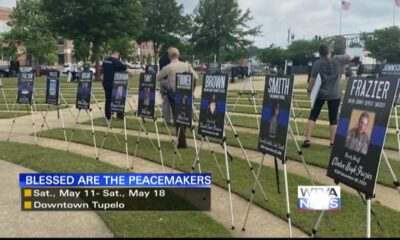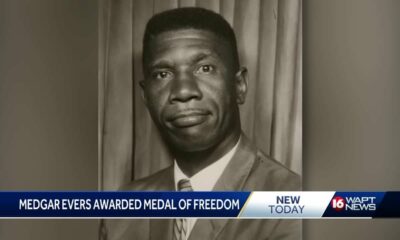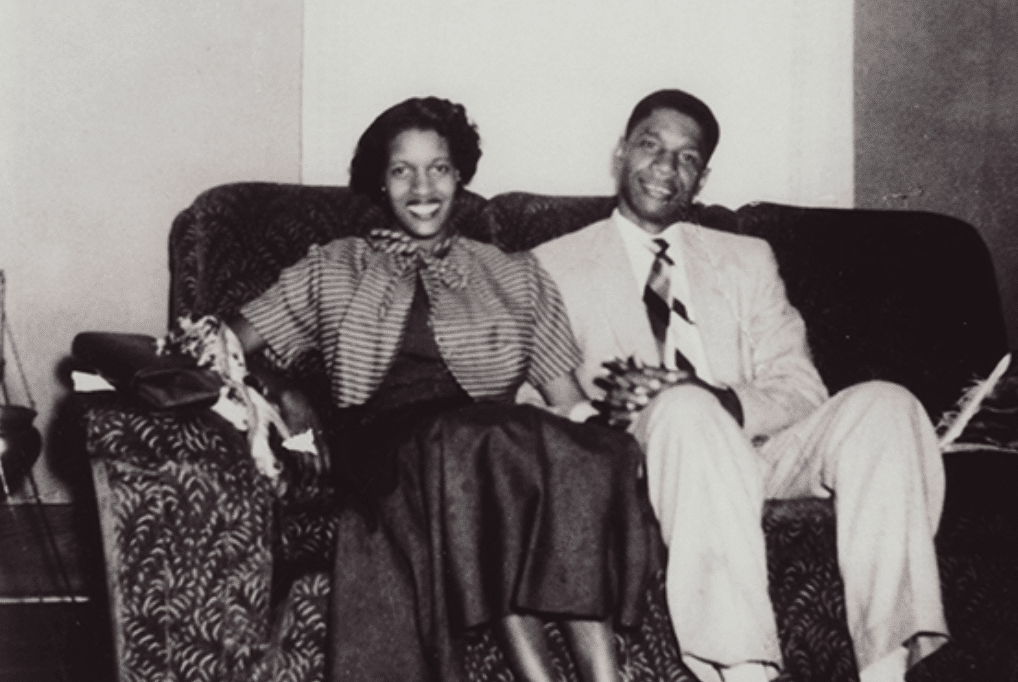Mississippi Today
Recriminations fly as Reeves, Presley accuse each other of lies in fiery Mississippi gubernatorial debate


Mississippi voters who tuned in Wednesday night were treated to the most heated gubernatorial debate in recent history, as Republican Tate Reeves and Democrat Brandon Presley accused each other of lying, corruption, lying, offering up bad policies and lying.
The two frequently talked over each other and the moderators — and loudly when their mics were shut off. Recriminations flew.
“When he qualified to run for governor he couldn't make it an entire hour without lying to the people of Mississippi,” incumbent Reeves said early in the hour-long scrum. “And on this debate stage he couldn't make it one full minute without lying to the people of Mississippi.”
Presley quipped: “I told somebody recently that asked me about negative ads, ‘If he'd quit lying on me, I'd quit telling the truth on him.'”
Post-debate, each camp and their party leaders claimed victory. Both candidates landed blows, dodged and parried. Neither appeared to offer any major new policy, platform planks or accusation against the other likely to sway undecided voters. Perhaps not surprising given their only debate happened just six days out from Tuesday's election, the candidates mostly used talking points from their stump speeches and recent barrage of millions of dollars worth of ads attacking each other.
WAPT moderators Megan West and Troy Johnson, at times growing a little flustered, tried to keep the sparring politicians on topic with questions mostly sent in by the public, including a few video-recorded questions from Mississippians.
WATCH: Full debate between Gov. Tate Reeves and Brandon Presley
Mississippi's health care and hospitals crisis, and Medicaid expansion as a possible solution
Reeves said that Medicaid expansion is “probably the topic that my team and I have worked on more than any other.” This might surprise some advocates, as Reeves has long been a major opponent of Mississippi accepting federal money to expand Medicaid coverage to working poor people as 40 other states have, and he's appeared to eschew it out-of-hand with little discussion.
“At the end of the day, it does not make sense for the people of Mississippi,” Reeves said. “If you add 300,000 people, 100,000 would currently be on private insurance, so putting them on the government rolls doesn't make any sense.”
Reeves said a plan he recently proposed to tax hospitals more and enable them to draw down more federal Medicaid reimbursement dollars is a better solution for hospitals. He has also repeatedly said he'll focus on creating better jobs that offer insurance.
READ MORE: Gov. Reeves announces 11th hour plan for hospital crisis. Opponents pan it as ‘too little, too Tate'
Presley has made Medicaid expansion a focus of his campaign. He said Mississippi receiving the $1 billion a year in federal dollars would help the large number of uninsured working Mississippians, help save struggling hospitals and create an estimated 16,000 new jobs.
“It's past time to do it,” Presley said. “… The truth of the matter is, Tate, there's a majority in the House and Senate of Democrats and Republicans right now that want to expand Medicaid, and you're standing in the way of 230,000 working people that have jobs that you're too good to do yourself that would benefit if we expanded Medicaid … A majority of Republican support expanding Medicaid. A majority of Mississippians support it … We have 34 hospitals on the brink of closure, and Tate Reeves didn't open his mouth in this campaign about trying to help those hospitals until he got in a tight race and you saw the polls tightening, and then he came up with a scheme that's going to actually tax our hospitals.”
Presley has in the past vowed to expand Medicaid, day one, if elected. Reeves said, “He doesn't have the authority to do anything on the first day in office. But like everything else he proposes, he simply is lying to the people of Mississippi.”
“There are unintended consequences of expanding Medicaid to 300,000 Mississippians,” Reeves said. “The unintended consequence is moving individuals off of private insurance. And, by the way, that's bad for rural hospitals as well because the fact is when you move them from private insurance, the reimbursement rates for those 100,000 people are actually lower when they go on Medicaid.” Reeves said Louisiana and Arkansas have both expanded Medicaid, and they also have rural hospitals facing closure.
Presley said that as governor, he could ask federal Medicaid for a waiver that would allow him to start Medicaid expansion. “I don't know if the governor knows the authority of his job or not … Tate Reeves' own state economist says that this program will pay for itself. Well, if he doesn't believe his own state economist, he ought to fire him.”
READ MORE: Brandon Presley again vows to expand Medicaid as Gov. Tate Reeves reiterates opposition

Corruption, particularly Mississippi's massive welfare scandal, attack ads and the influence of campaign donors
Presley pulled out the only prop of the night — paper copies of text messages — and said Reeves “has been ensnarled in the largest public corruption scandal in Mississippi history.”
“We found out (Reeves') brother, we've got text messages for his brother,” Presley said as he pulled papers from his suit coat. “He was text messaging with Brett Favre about how to be a PR agent.
“Seventy-seven million dollars was diverted for things like Brett Favre on a volleyball court, for Tate Reeves' personal trainer, $1.3 million dollars,” Presley said. “And what did Tate do? He fired the independent investigator. He delayed depositions 13 times indefinitely. He is at the center of the state's largest public corruption scandal. And so what do crooked politicians do when they've been caught in a scandal like this? They try to throw some sort of accusations at somebody else.”
Reeves denied any involvement in the welfare scandal and, as he has done in campaign ads, accused Presley — who's serving as a state Public Service commissioner — of accepting illegal campaign contributions from solar companies.
READ MORE: Solar company's donations to Brandon Presley appear legal. But should he have accepted them?
“You would have to believe in time travel to believe I was involved in the TANF scandal,” Reeves said. “It all happened before I was governor … He'll lie about my family, lie about me, lie about what he believes or doesn't believe because he doesn't have any of his own beliefs.”
“Three public service commissioners have gone to jail in the last 30 years for doing the same thing Brandon Presley did,” Reeves said. “… He's taken money from his solar panel buddies. He's approved their ability to produce energy. That's illegal in Mississippi (for a PSC commissioner to take donations from a regulated utility). The law is clear and Brandon Presley knowingly broke the law.”
Presley said Reeves' claim is “a bald-faced lie.”
“And I'll tell you why he knows it's a lie,” Presley said. “The minute that the company involved threatened his campaign with a lawsuit for defamation, guess what he did. He changed the ad … These solar companies are not public utilities, and Tate Reeves knows that.”
Presley has made ethics reform and fighting corruption a major plank in his platform, and early in his campaign presented a detailed plan for reforms. On Thursday he accused Reeves of being “the biggest cheerleader for corruption, with pom-poms on … and if you think Tate Reeves will take on corruption, I've got some beachfront property in Nettleton to sell you.”
Each candidate accused the other of being bought and paid for by big-money campaign donors. Reeves said Presley has sold out to the national Democratic Party. Presley said Reeves has been bought off by big donors who get large state contracts in exchange.
READ MORE: Gov. Tate Reeves' top political donors received $1.4 billion in state contracts from his agencies
“Eighty percent of the money that he is spending in this campaign has come from California, New York, Massachusetts and Washington, D.C.,” Reeves said. “And if you're keeping score at home, that's over $10 million in far-left radicals funding his campaign.”
Presley said to Reeves onstage: “The truth is, you're a bought-and-paid-for politician, and you know it, and the people of Mississippi know it … He is the poster child of this broken, corrupt system … There's a report out just yesterday about Tate Reeves' pay to play scheme … his contributors benefitted over a billion dollars in state contracts. One guy gave him $25,000, and then about 48 hours later he became a gaming commissioner.”
The candidates' jabs at each other on alleged corruption got so heated and drawn out a moderator urged, “Gentlemen, we need to move on. We have to move on.”
Tax cuts: eliminating the state income tax or tax on groceries
Both candidates have vowed to cut taxes, but each has a different focus. Reeves vows to continue a push to eliminate the state income tax. Presley vows to eliminate the state's sales tax on groceries. They were asked how they plan to get this done and to replace lost revenue. Neither directly answered those questions.
“I've been a tax cutter as governor,” Reeves said. “I was a tax cutter as lieutenant governor. In fact, in 2016 we passed the larges tax cut in Mississippi history. In 2021 we passed an even bigger tax cut. Combined, we've cut taxes over $1.2 billion for the people of this state. I do believe that eliminating the income tax is the best public policy for the state.”
Presley said: “Look, I want to cut the sales tax on groceries. We have the highest sales tax on food of any state in the United States. If you go out tonight and buy feed for a hog or feed for a cow, you pay zero sales tax. But if you want to feed your baby or you want to feed your family, you pay the highest sales tax in America.”
READ MORE: Tate Reeves, Brandon Presley pitch different tax cuts to voters. Who, exactly, would benefit?
Presley said Reeves has had 12 years to get income tax elimination done and that he “talks so tough but does so little.”
Reeves said: “If you earn income, if you make a living in this state, we've cut your taxes. You have more money in your pocket because of conservative leadership in the Legislature and the governor's office. And if we turn Mississippi blue, we would never see another tax cut in the state of Mississippi.”
Public education, funding for schools and teacher pay
Reeves, as he has done many times on the campaign trail, touted public education achievements made over the last decade, teacher pay raises and increased spending for schools.
“The Mississippi miracle — that's what the New York Times called it, and the New York Times is very rarely nice or generous to Mississippi,” Reeves said. “… We passed conservative reforms in 2013 and 2014 that laid the groundwork for the best educational achievement levels in the history of Mississippi.”
Reeves noted marked improvements in fourth-grade reading and math, and higher high school graduations rates, and “the largest teacher pay raise in state history … $6,100 more per year.”
Presley said he's being supported by teacher groups including the Mississippi Association of Educators. He said he would push for full funding of the state's adequate education formula, “that we have not fully funded education but two times in the entire existence of our school funding formula.”
“It's evident who educators in this race support and know will really have their back,” Presley said. “… They looked at Tate Reeves' record. They looked at my record and looked at my platform and they chose to endorse me over him … He brags about teacher pay raises. I think we're measuring wrong on teacher pay … Instead of bragging about getting to the Southeastern average, we ought to bet teacher pay to the national average.”
Reeves said the educators supporting Presley are from teacher unions, with ties to national liberals “who led the effort to shut down our schools during COVID-19.”
READ MORE: Gov. Tate Reeves supported fully funding public education before he was against it
Presley provided an anecdote of a teacher he talked with last week in north Mississippi, who told him “she netted out about $23 a month” from the teacher pay raise Reeves touted. Some teachers have recently reported their take-home from raises ended up shrinking because of increased insurance and other costs.
Reeves responded to Presley: “There is no possible way that a teacher netted $23 a month on a $6,100 a year pay raise. Brandon Presley can't do math. He lies really well, but he can't do math.”
READ MORE: Lawmakers pass largest teacher pay raise in Mississippi history
The candidates accused each other of being out of step with rank-and-file Mississippians.
“He wants to talk about California and New York,” Presley said. “Let me tell you this, governor, how about you talk about Caledonia and New Hebron? You're obsessed with California and New York. I ain't been to California — I don't even know what you're talking about.”
Reeves said: “Can I just say something about Caledonia?”
Presley, who has visited all 82 counties in his campaign, said: “Have you been there?”
Reeves said: “Yes. I went to breakfast in Caledonia last Monday morning and I'm gonna tell you something, Brandon, you're gonna get more votes in California than you get in Caledonia.”
This article first appeared on Mississippi Today and is republished here under a Creative Commons license.
Mississippi Today
Legislature, flush with cash, passes budget, completing work for 2024 session
The Mississippi Legislature completed its work for the 2024 session on Friday with the passage of a $7 billion state budget – 5.8% larger than the budget it passed last year.
The $7 billion reflects the amount spent on recurring expenses. The budget last year, including one-time funds, COVID-19 federal relief funds and other one-time money for specific projects, actually was more than the budget passed this year.
The completion of the budget late Friday ended the bulk of lawmakers' work for the 2024 session, but legislators will return briefly Saturday to take care of procedural issues. Plus, the Legislature might reconvene on May 14 to deal with any veto from Gov. Tate Reeves.
One of the final actions on Friday was approving a massive bill that provides state money for projects throughout the state. The legislation funds tourism projects, work on local governmental office buildings and other projects for individual legislators.
Th total amount of the projects was $227.4 million.
In the past, projects were often funded by borrowing. But in recent years, thanks in large part to an infusion of federal COVID-19 funds and other federal funds, Mississippi, like most other states, has been flush with cash, allowing those projects to be funded with cash instead of long-term debt.
Senate Finance Chair Josh Harkins, R-Flowood, told senators paying for the projects with cash will not continue in future years. State revenue has begun to slow.
Harkins told senators there were more than $1 billion in requests on the local level for projects.
Sen. Angela Turner Ford, D-West Point, asked Harkins how it was decided which projects to fund.
Harkins said the focus was on infrastructure projects and other projects where it was viewed the greatest need was.
In addition to the pet projects for lawmakers, other capital spending included:
- $110 million for university projects.
- $45 million for community college projects.
- $160 million for work on improving state Highway 7 in Lafayette County.
- $90 million for work on U.S. I-55 in DeSoto County.
- $50 million for work on state office buildings throughout the state.
In total, $820 million was committed in surplus funds for building projects throughout the state. Plus, $110 million in surplus funds was pumped into the Public Employees Retirement System to help shore up the government pension plan.
In terms of the budget to operate agencies, House Appropriations Chair John Read, R-Gautier, said state agencies are receiving an average 5% year-over-year increase in funding.
That increase includes money to pay for increases in the premiums for the state employee health plan and to pay for a .5% increase for each state agency in the contribution to the state retirement plan.
Lt. Gov. Delbert Hosemann said before the session began that dealing with financial issues facing PERS was one of the top priorities.
“We tackled the PERS issue,” Hosemann said, though, some argued that the legislative solution did not resolve all the financial issues facing the system.
Senate Appropriations Chair Briggs Hopson, R-Vicksburg, said the state budget provides funds to allow state agencies to deal with inflation.
“The budget is reflective of the times,” Hopson said. “State agencies are not immune to inflation. In order to provide services at the same level, we have to spend additional funds.”
The budget includes an additional $240 million in funding for K-12 schools.
This article first appeared on Mississippi Today and is republished here under a Creative Commons license.
Mississippi Today
On this day in 1850


May 3, 1850

Shadrach Minkins, already separated from his family, escaped from the Norfolk, Virginia, home, where he was enslaved. He made his way to Boston, where he did odd jobs until he began working as a waiter at Taft's Cornhill Coffee House.
Months later, Congress passed the Fugitive Slave Act, which gave authorities the power to go into free states and arrest Black Americans who had escaped slavery.
A slave catcher named John Caphart arrived in Boston, with papers for Minkins. While serving breakfast at the coffee house, federal authorities arrested Minkins.
Several local lawyers, including Robert Morris, volunteered to represent him. Three days later, a group of abolitionists, led by African-American abolitionist Lewis Hayden, broke into the Boston courthouse and rescued a surprised Minkins.
“The rescuers headed north along Court Street, 200 or more following like the tail of a comet,” author Gary Collison wrote. They guided him across the Charles River to the Cambridge home of the Rev. Joseph C. Lovejoy, whose brother, Elijah, had been lynched by a pro-slavery mob in Illinois in 1837.
Another Black leader, John J. Smith, helped Minkins get a wagon with horses, and from Cambridge, Hayden, Smith and Minkins traveled to Concord, where Minkins stayed with the Bigelow family, which guided him to the Underground Railroad, making his way to Montreal, spending the rest of his life in Canada as a free man.
Abolitionists cheered his escape, and President Millard Fillmore fumed. Morris, Hayden and others were charged, but sympathetic juries acquitted them. Meanwhile in Montreal, Minkins met fellow fugitives, married, had four children and continued to work as a waiter before operating his own restaurants.
He ended his career running a barbershop before dying in 1875. A play performed in Boston in 2016 told the dramatic story of his escape.
This article first appeared on Mississippi Today and is republished here under a Creative Commons license.
Did you miss our previous article…
https://www.biloxinewsevents.com/?p=355311
Mississippi Today
Medgar Evers will receive Presidential Medal of Freedom

At her husband's funeral in 1963, Myrlie Evers heard NAACP Executive Director Roy Wilkins declare, “Medgar Evers believed in his country. It remains to be seen if his country believes in him.”
Later today, his country will declare its belief in him when the family of the slain Mississippi NAACP leader receives the Presidential Medal of Freedom, the highest civilian honor.
But Medgar Evers was more than a civilian. He fought the Nazis in World War II, only to return home and fight racism, this time in the form of Jim Crow, which barred Black Mississippians from the ballot box.
On his 21st birthday, he and other Black veterans of the war went to vote at the courthouse in Decatur, where they were met by white men with guns.
Afterward, he vowed he would never be defeated again and that he would keep fighting by joining others dedicated to the cause of the civil rights movement.
“The movement for equality was always on his mind, and whites' denial of his right to vote in his hometown served as one cog of many in the overall wheel of injustice, a wheel of which he was bound and determined to break,” said Michael Vinson Williams, author of “Medgar Evers: Mississippi Martyr.”
Myrlie Beasley met Medgar Evers on the first day of her freshman year at Alcorn A&M College in fall 1950. As she leaned against a light pole, she said he told her to be careful, “you might get shocked.”
And shocked she was when she fell in love and married him a year later. He was one of those military veterans that her family had warned her about. And he was involved in the movement that her family had avoided.
She joined him in the fight, and they moved to Mississippi's only all-Black town, Mound Bayou, where he helped Dr. T.R.M. Howard lead a boycott. They distributed thousands of fluorescent bumper stickers that read, “Don't Buy Gas Where You Can't Use the Restroom.”
In January 1954, the University of Mississippi School of Law turned Medgar Evers away because of the color of his skin. NAACP officials considered taking his case to court, but they were so impressed with him they hired him instead as the first field secretary for the Mississippi NAACP.
Myrlie Evers worked as his secretary. She said he insisted they call each other “Mr. Evers” and “Mrs. Evers” in the office.
He spent much of his time on the road, putting 40,000 miles a year on his car, recruiting new members, reviving branches and inspiring young people to participate in the movement, including Joyce Ladner, who invited him to speak to the NAACP Youth Council in Hattiesburg.
“He had a quiet courage,” she recalled. “I was always amazed that he drove up and down Mississippi's two-lane highways alone at night. He was a marked man, but he kept on going.”

In 1961, Joan Trumpaeur Mulholland was one of more than 400 Freedom Riders, half of them white, who challenged segregation laws in the South. She and other Riders were arrested and sent to serve their time at the State Penitentiary at Parchman.
When she and other Riders needed a lawyer, Medgar Evers “was the one who took care of it,” she said.
He became a model for her and others in character and courage, talking often to Tougaloo College students, she recalled. “He wasn't intimidated.”
In 1962, Evers installed Leslie McLemore as president of the Rust College chapter of the Mississippi NAACP. “Medgar Evers was really a brilliant man,” he said. “He had an incisive mind and personality that drew people to him. In another era, he could have been a U.S. senator from Mississippi or maybe even President.”
Evers investigated countless cases of intimidation and violence against Black Americans, including the 1955 murder of Emmett Till. Evers often dressed as a sharecropper in those investigations.
No matter where he went, threats of violence followed. He bought an Oldsmobile 88 with a V-8 engine so powerful it would leave most cars behind. On some dark nights across the Mississippi Delta, he floored it to escape those hell-bent on harming him.
His name appeared on Ku Klux Klan “death lists,” and his home telephone rang at all hours with threats to him and his family.
When his daughter, Reena, answered the phone one time, she heard a man saying he planned to torture and kill her father.
In spite of these threats, he stayed. He told Ebony magazine, “The state is beautiful, it is home, I love it here. A man's state is like his house. If it has defects, he tries to remedy them. That's what my job is here.”
On May 20, 1963, Evers talked on television about the mistreatment of Black Mississippians. “If I die, it will be a good cause,” he told The New York Times. “I'm fighting for America just as much as the soldiers in Vietnam.”
Weeks later, President Kennedy delivered his first and only civil rights speech, telling the millions watching on television, “If an American, because his skin is dark, cannot eat lunch in a restaurant open to the public, if he cannot send his children to the best public school available, if he cannot vote for the public officials who will represent him, if, in short, he cannot enjoy the full and free life which all of us want, then who among us would be content to have the color of his skin changed and stand in his place?”
Evers smiled. He and other Black leaders had urged Kennedy to push Congress for a civil rights bill, and now that seemed certain to happen.
Hours later, returning home from a late civil rights meeting, Evers was shot in the back in the driveway of his Jackson home.
Myrlie Evers and their three children dashed outside, saw the blood and screamed. “Daddy!” Reena yelled. “Please get up, Daddy.”
He never did.
“He had the courage to hold an impossible job at a crucial turning point in American history,” said Taylor Branch, the Pulitzer Prize-winning author of a trilogy on the civil rights movement.
For the first time, members of the mainstream press didn't call such a killing “a lynching,” he said. “They called it an assassination.”
In his book, “Parting the Waters,” he wrote, “White people who had never heard of Medgar Evers spoke his name over and over, as though the words themselves had the ring of legend. It seemed fitting that the casket was placed on a slow train through the South, bound for Washington so that the body could lie in state.”
After the casket arrived, Medgar Evers was buried with full military honors at Arlington National Cemetery.
“The tragedy of his martyrdom is eloquent testimony to the courage and dedication of a leader who — in his lifetime — deserved the respect and support of the powerful people who later publicly identified with this man and his cause,” said John Dittmer, author of “Local People: The Struggle for Civil Rights in Mississippi.” “Though long overdue, this award is a fitting tribute to Medgar Evers and his family.”
A year after Evers' assassination, Congress passed the Civil Rights Act on his birthday, and President Lyndon B. Johnson signed the bill into law hours later.
“Medgar Wiley Evers boldly stood against injustice, against oppression, against this country's determination to keep Black people as second-class citizens,” Williams said, “and he was murdered because of his commitment to truth, justice and the struggle for civil and human rights.”
Before leaving office as governor in 1984, William Winter hosted Myrlie Evers and her family at the mansion, where he remarked that Medgar Evers did more than just free Black Mississippians, he freed white Mississippians as well from the bonds of racial segregation, oppression and hate, he said. “We were all prisoners of that system.”
It took three decades before Evers' killer was finally brought to justice in 1994, and that verdict helped to inspire the reopenings of other cases. There have been 24 convictions in civil rights cold cases.
Myrlie Evers' courage to press for justice in her husband's case started all of this, said Leslie McLemore, who helped found the Fannie Lou Hamer National Institute on Citizenship and Democracy. “It would not have happened without her persistence.”
When she learned last week about the Presidential Medal of Freedom honoring her late husband, she exclaimed to her daughter, Reena Evers-Everette, “Oh, my God!”
Then Myrlie Evers grew silent.
“I'm just utterly speechless,” she said, “and frozen with gratitude.”
Evers-Everette still misses the man she knows as “Daddy,” but she perseveres as the executive director for the Medgar and Myrlie Evers Institute, because his spirit inspires her.
“I feel him around me all the time,” she said. “I marvel at his courage, stamina, vision, and commitment for equality and justice for his people and all of humanity. I pray for his love and wisdom as I pursue this work, because I don't want him to have died in vain.”
This article first appeared on Mississippi Today and is republished here under a Creative Commons license.
Did you miss our previous article…
https://www.biloxinewsevents.com/?p=354725
-
Mississippi Today6 days ago
On this day in 1951
-
SuperTalk FM1 day ago
Driver’s education set to become mandatory in Mississippi as bill passes
-
SuperTalk FM4 days ago
Festival merger in Leland sets up one major event for Mississippi Delta
-
Mississippi News6 days ago
One injured in Mississippi officer-involved shooting after chase
-
SuperTalk FM4 days ago
PERS bill set to phase in employer rate increase heads to governor’s desk
-
Mississippi Business3 days ago
Geartek expanding operations in Alcorn County
-
Mississippi News3 days ago
Two women accused of shoplifting across southeast captured in Mississippi
-
Mississippi News1 day ago
Altercation at Mississippi police department leads to officer-involved shooting








































